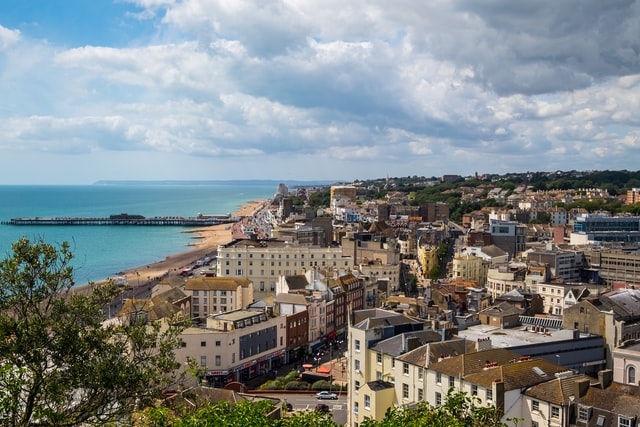The tracker focuses on towns that have received substantial social investment and grant funding from each funder: Birkenhead, Great Yarmouth, Grimsby, Hastings, Hartlepool, Margate, Morecambe, Penzance, Plymouth and Redcar.
The tracker will test whether a greater presence of social infrastructure in a place creates resilience in the local economy. In this context, social infrastructure consists of the spaces, facilities and networks that are crucial to developing and maintaining social connections within a community. This includes community hubs, libraries, local heritage, museums, parks, pubs and cafes, as well as local services and organisations, such as those that work in mental health, skills and training, social care or youth services.
This new tracker builds upon previous analysis of the economic impact of Covid-19 at a local level, as demonstrated in the Tortoise Corona Shock series. The data covers 78 high streets across the 10 towns and will provide dynamic information on retail business and local economic activity every month. The trackers will also map the composition of the high streets in each town – including a breakdown of spending by sector, the density of social infrastructure and its socio-economic profile. These will be compared against a national benchmark, as well as against other coastal towns over time.
The data in the tracker so far covers January 2019 – January 2021. Initial insights include:
- The effect of the pandemic has been uneven, with high streets in different towns having dramatically contrasting experiences: High streets in Plymouth saw a collapse in spending down as low as -83% in April 2020 and has never recovered; whereas Redcar saw smaller early losses and has since maintained spending levels 10-20% above 2019 levels – suggesting people in Redcar are making greater use of their local high streets following the onset of the pandemic.
- Seaside resorts saw a summer surge in spending, which was not shared in other coastal towns: Great Yarmouth, Margate, Morecambe, and Penzance saw significant increases in total sales in August 2020 compared with 2019 – suggesting that increased domestic tourism and policies like Eat Out to Help Out were working. This was not seen in other coastal towns like Grimsby, Hartlepool, Plymouth and Birkenhead, which all saw reductions in spending compared with the previous year.
- Grocery spending has skyrocketed, but the hospitality sector is in serious trouble: over the year, grocery spending across all high streets was on average 27% higher than previously, but spending on the ‘food and drink’ sector (hospitality) was -25% below 2019 levels – this was despite a 20% boost in sales during the months of August and September.
The trackers will continue to monitor high street performance over the coming year to develop a better understanding of how these places are recovering from the pandemic, what role social infrastructure plays in this recovery, and where future funding and support can be best targeted to bolster local economies.
Nick Temple, Chief Executive of SIB, said:
“We are delighted to be launching our new Coastal High Street Tracker alongside the Architectural Heritage Fund and Power to Change. Since the beginning of the Pandemic, our data team have been tracking and mapping the impact of COVID-19 at a local economic level. We know that coastal towns were initially among the places hardest hit by the drop in spending due to lockdowns. In publishing even more granular data on these 10 towns, we hope this can inform where social investment is needed most in the recovery.”
Matthew Mckeague, Chief Executive of the AHF, said:
“Along with our partners at SIB and Power to Change, we are committed to continuing to understand more about the unique contribution social infrastructure can make to the development and revival of local economies and high streets. A lot of vital social infrastructure is housed in historic buildings, and these buildings make a huge contribution to the civic and community identity of places. We want these trackers to help inform how we support and expand this asset base, particularly as high streets evolve, and we’re really looking forward to learning from the data that emerges.”
Vidhya Alakeson, Chief Executive of Power to Change, said:
“Community businesses have a powerful role to play in the civic high street of the future and the recovery of our local economies, post pandemic. In many of the towns included in this study, we are already starting to see beginnings of this new civic model emerging. It will be fascinating to see how over time, spending in these places will stack-up against high streets that are still tied to a chain retail model. I’m excited to see how this data can further strengthen the case for putting communities in charge of local recovery.”
How to view the tracker
You can view the coastal High Street Tracker here.
-Ends
About Social Investment Business
Social Investment Business provides finance to create fairer communities and improve people’s lives. They do this by providing the money and support they need directly, partnering to support them effectively and, using their knowledge to inform their own work and influence others.
Since 2004, SIB has deployed and managed over £400m of loans and grants into over 2,000 organisations and enabled almost 1,000 more to get dedicated support through programmes.
About The Architectural Heritage Fund
The Architectural Heritage Fund (the AHF) is a registered charity, working since 1976 to promote the conservation and sustainable re-use of historic buildings for the benefit of communities across the UK. They do this by providing advice, information and financial assistance in the form of early project grants and loans for projects undertaken by charities and not-for-private profit organisations.
About Power to Change
Power to Change is the independent trust that supports community businesses in England.
Community businesses are locally rooted, community-led, trade for community benefit and make life better for local people. The sector owns assets worth £870m, and comprises 11,300 community businesses across England who employ more than 37,000 people. (Source: Community Business Market 2020)
From pubs to libraries; shops to bakeries; swimming pools to solar farms; community businesses are creating great products and services, providing employment and training and transforming lives. Power to Change received its endowment from the National Lottery Community Fund in 2015.
Image credit: Ben Guerin on Unsplash



